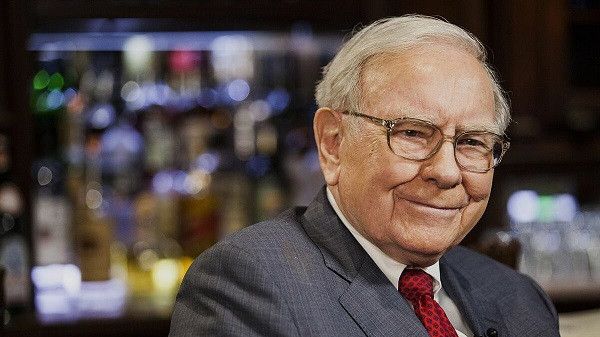Warren Buffett: Applying these 5 "simple" mindsets is investing "with a hundred victories out of a hundred"

The billionaire once said that a person does not need to be exceptional to invest. He has also given a lot of advice to young investors to enter the "market" wisely. Warren Buffett is always known for his simple lifestyle, which is why he also offers "simple, easy-to-do" investment advice that is "a hundred victories out of a hundred".
1. Don't lose money
In fact, the billionaire also lost billions of USD during the financial crisis in 2008. Therefore, his first investment rule may sound strange. However, Warren Buffett does not say that you should not lose money during the investment process, but he wants to emphasize the "mindset" that an investor should have. He advises that people should do their homework (actually do the homework) before investing. It may sound confusing, but the billionaire means that you should never allow yourself to think: losing money is okay. The lesson learned: The homework here is the general knowledge about the company or type of potential asset you intend to "invest in". Keep in mind that you must not lose money, "avoid letting money fall", from which you will form a cautious mindset and study it thoroughly.
2. Never invest in something you don't understand well
According to Buffett, "The risk in investing comes from not knowing what you are doing." His advice is to only invest in things you fully understand and can explain to others. The lesson learned: For example, if you are planning to invest in assets like stocks, bonds, real estate, etc., you need to take the time to understand their risks and success rates. For a company, you should research how it operates or its business status to filter potential names.
3. Pursue a long-term strategy
Investing is a long-term endeavor. If the company grows, you will reap corresponding benefits. However, in the short term, that company may not grow quickly and may need a certain amount of time. Don't let fear of volatility lead you to make hasty or poorly timed buying and selling decisions. The lesson learned: Study your investment portfolio carefully, trust it, and build a long-term strategy.
4. Don't invest with borrowed money
Buffett calls investing with borrowed money "madness." Although a stock may rise sharply today, it can also fall to the bottom tomorrow. If you borrow money to play the stock market, your strategy will be heavily affected by the need to repay debts. Some stock markets need to be invested in for the long term, but under debt pressure, it will be very difficult for you to hold them. The lesson learned: Nothing is certain. All investments carry risks. If you have the ability to invest, then use your own money.
5. Don't follow the crowd
He once shared: "Be fearful when others are greedy and be greedy when others are fearful." In the face of market fluctuations, whether good or bad, instead of following the crowd, you should think, analyze, and consider the most suitable investment options. The lesson learned: You may not be able to determine the timing of the market, but you can decide when to "invest" your own money. Billionaire Warren Buffett has a secret stock portfolio, making transactions similar to those of the Berkshire Hathaway portfolio in the previous quarter. Through Berkshire, Buffett and his associates manage a portfolio that includes stocks worth nearly $300 billion as of December 31. Additionally, through General Re – a subsidiary of Berkshire, the investment legend owns a portfolio worth $5.4 billion managed by New England Asset Management – which provides investment management services for insurance companies. New England Asset Management was acquired by General Re in 1995. In 1998, Berkshire Hathaway acquired General Re for $22 billion, making New England Asset Management a wholly-owned subsidiary of the investment group. Although "looking through" Buffett does not influence how the portfolio is managed by New England Asset Management, this portfolio holds stocks and has some transactions almost similar to Berkshire, according to the 13F filings submitted to the SEC.
New England Asset Management sold 90% of its position in US Bancorp and 100% in Bank of New York Mellon in the previous quarter. Meanwhile, Berkshire also reduced its position in US Bancorp by 91% and sold 59% of its shares in Bank of New York Mellon. Other similarities between the two portfolios are that they are both heavily focused on a certain group, with the top 10 stocks in New England Asset Management's portfolio accounting for 91% of its weight. The top 10 stocks of Berkshire account for 89% of the company's asset value. Furthermore, New England Asset Management has a similar approach to Buffett and also holds some stocks for the long term, specifically for decades, such as Chevron, Cisco, JPMorgan, etc. However, the portfolios of these two companies also had some differences last month. For example, New England Asset Management reduced its position in Apple, while Berkshire bought more shares in this iPhone manufacturer.
In fact, there is no specific formula to calculate how much lower a stock's price is than its intrinsic value. The most common way is to evaluate the fundamental factors of the business, and value investors will seek to buy stocks that they believe most others do not see the potential of. But Warren Buffett takes this investment approach to a higher level, as he not only views stocks as expensive or cheap based on supply and demand evaluations, but also on the profitability from the business operations of the company itself. In reality, the legendary investor does not care about market activity. When investing in a particular stock, he does not care whether the market will recognize the value of that stock in a few years, but rather how much money this business will make in the coming years.
Warren Buffett: The key that helps me succeed is "summed up" in one word

A great entrepreneur
Warren Buffett's full name is Warren Edward Buffett, a business tycoon, an investor, and is known as the "Sage of Omaha." He was born on August 30, 1930, in Omaha, Nebraska, USA. Currently, Buffett is the Chairman, CEO, and also the largest shareholder of the multinational company Berkshire Hathaway. According to Forbes estimates, Warren Buffett is currently ranked 5th on the list of the world's billionaires with a net worth of up to $118 billion. According to real-time statistics, his wealth is at $100.2 billion.
The key to unlocking the door to success
In the HBO documentary Becoming Warren Buffett, viewers witnessed an iconic scene that is valuable to this day. When asked to write down what he considers the most important factor contributing to his success, he wrote down a single word: "focus." This word may seem simple but is highly valued by many of the world's geniuses. Statistics show that many successful people around the world believe that focus and determination to pursue a single goal to the end is the key factor that helps them achieve "huge" wealth. Although in reality, the measure of success for each person varies over time. In the past, people living during the Renaissance were considered successful when they discovered new things for the world or had a vast amount of knowledge. But today, people often take wealth or consider the best among the best in a community as the measure of success. However, regardless of the time period or standard, "focus" remains the determining factor for a person's success or failure. So how can one maintain focus and cultivate it? The first step is to set specific goals or destinations. For example, you can set a goal to become a millionaire by the age of 40. Then, the next step is to plan for each milestone to achieve that destination. Especially, during this phase, you need to focus to not deviate from the planned course until you reach the final destination.
Focus on your own path
Warren Buffett is considered a legend. He has many paths to choose from, but he says he has not followed the path of others but chose to focus on his own goals. The billionaire always chooses business types that he understands well and only makes investment decisions if he feels it is necessary. He makes very few "transactions," limiting hasty "investment" decisions and focusing on a few goals that are most beneficial to him. People live in a society of action, but focus is not just about "100% attention" to the goal and acting on it. Focus also means that you must truly understand what you are currently doing and what you intend to do in the future. In today's life, there are many things that distract people from their goals. If you feel you are deviating, eliminate time-wasting activities that do not yield results. When you are taking a step in the plan, ask yourself whether that action will bring you the ultimate benefit. If the answer is no, discard it immediately. If the answer is yes, make sure it is the most necessary thing to do and that nothing can affect it. It is this focus that has helped billionaire Warren Buffett achieve the success he has today. If you apply this key and persist, an ordinary person can also achieve accomplishments soon.
